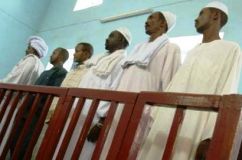Sudan promotes its domestic Darfur Court on eve of UN talks
UNITED NATIONS, June 29, 2005 (AP) — Sudan sent a letter to the U.N. Security Council promoting its new domestic court to prosecute atrocities in Darfur, shortly before the council was to discuss the International Criminal Court’s investigation into the alleged war crimes.

|
|
Six Sudanese men stand in the dock in a court in Nyala September 30, 2004, accused of belonging to the Arab militia. (Reuters). |
The Security Council mandated at the end of March that the international court, known as the ICC, prosecute war crimes suspects in Darfur. Sudanese officials are vehemently opposed to the world’s first permanent war crimes tribunal and have said they will not hand over suspects.
The letter, circulated Tuesday, noted that Sudan had set up the Special Criminal Court on the Events in Darfur on June 7 and that the government was both “capable and desirous” of punishing people responsible for atrocities in the region.
On Wednesday, the council was to get its first briefing from ICC prosecutor Luis Moreno Ocampo. In an interview earlier this month, Ocampo said the court was collecting evidence and determining who was most responsible for war crimes in Darfur.
U.N. officials have repeatedly said that while they welcome the government’s decision to prosecute Darfur criminals, a Sudanese tribunal can be no substitute for the ICC.
That hasn’t stopped Sudan.
The Sudanese tribunal is “understood to be a major court according to the legal concepts prevailing in Sudan,” Sudanese Supreme Court Chief Justice Jalal el-Din Mohammed Osman said in a release attached to the letter.
Earlier this month, the ICC announced the start of an investigation into alleged war crimes in Darfur, where at least 180,000 people have died and 2 million have been displaced during two years of violence.
Darfur’s crisis erupted when rebels took up arms against what they saw as years of state neglect and discrimination against Sudanese of African origin. The government is accused of responding with a counterinsurgency campaign in which the ethnic Arab militia, known as Janjaweed, committed wide-scale abuses against ethnic Africans.
A U.N. commission of inquiry concluded in January that crimes against humanity had occurred in Darfur, although the mass killings fell short of a policy of genocide. It recommended that the case go to the fledgling court based in The Hague, Netherlands, and drew up a list of 51 potential suspects.
Also Tuesday, the United Nations said the death rate among displaced people in Darfur plunged in the last six months but could rise again in the upcoming rainy season because of malaria and other illnesses.
Preliminary results of a new survey found that the death rate was three times lower than in previous studies, and many deaths were still preventable. In West Darfur, nearly 50% of all child deaths were from diarrhea, it said.
The survey of about 26,000 people in three states in Darfur found the mortality rate had dropped to just below the crisis threshold of one person in 10,000 per day. Commissioned by U.N. humanitarian coordinator Manuel Aranda Da Silva, the survey was to be officially released next month.
